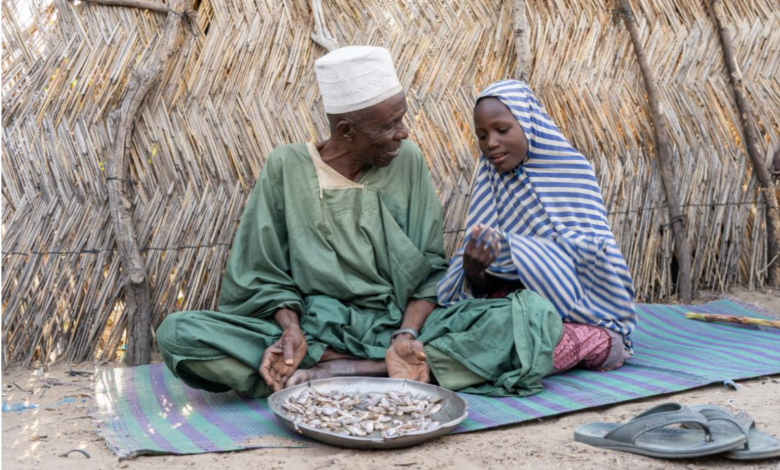‘My Heart Is In Pain’: Older People Not Spared From Boko Haram’s Onslaughts

The Boko Haram insurgency in Nigeria’s Northeast region has had often overlooked devastating effects on elderly people, Amnesty International points out in a new report shared with HumAngle.
Though the insurgents have occasionally spared older people during their attacks, at other times they kill and brutalise them just like everyone else. The impact of the crisis on the elderly is worsened because “they are often disproportionately present when Boko Haram attacks, as many are either unable to flee or choose not to, out of ties to their village”.
Titled, ‘My Heart Is In Pain’, Amnesty International’s report, which was released on Tuesday, is based on interviews with 62 older women and 71 older men in Borno and Adamawa states. Over 100 other people were interviewed as well, including aid workers, hospital employees, prison staff members, those who witnessed conflict-related deaths, and individuals employed to bury bodies from detention facilities.
The research was conducted between November 2019 and October 2020.
Aside from the risk of getting killed, older residents in northeastern communities, especially women, are kept from working on their farmlands. Food shortage is aggravated too because of the looting of livestock and produce. As a result, many have died from starvation.
A 65-year-old farmer from Bama Local Government Area in Borno State described how his three brothers, all aged, were killed by Boko Haram fighters for refusing to hand over their goats and sheep.
“The killings and food insecurity forced many older people to flee, even after staying during an initial attack. The journey by foot often takes several days and carries its own risks; many older people described suffering injuries that continue to affect them many months or years later,” Amnesty International stated.
“More often, however, the inability to flee, or decision not to flee, means that many older women and men live under Boko Haram for extended periods… As a result, even if older people face lower risks of being killed or seriously injured in any individual attack or incident, the long-term contact brings unique risks of abuse, violence, and deprivation.”
Older people are often killed when they are discovered to be plotting an escape or trying to flee. Other times, their caretakers are killed with the expectation that they will starve to death.
“Three Boko Haram came [to my house]. They said, ‘We heard you speaking with your boy, discussing how you’re going to escape.’ So they shot the boy… They didn’t touch me,” a 70-year-old man from Bama told the non-governmental organisation.
“They just said, ‘Your boy, the one taking care of you, he’s dead. So you’ll stay here and die.’ I stayed there for 11 more months. It was horrible. Since [they killed him], I never ate much. I was in pain. I became sick.”
Eventually, as the harmattan season approached, he asked for permission to go get firewood, took his axe, and continued walking till he got to a military checkpoint, resting against a tree whenever he got tired along the way.
Apart from being victims of assaults and summary executions themselves, older people in the region have also had to witness the cold-blooded murder or abduction of their family members – children and grandchildren. These have traumatised them psychologically and also inflicted economic hardships.
A 70-year-old woman from a village in Kala/Balge Local Government Area, Borno State, found the bodies of her sons, who had been killed by insurgents, at a market. They had gone to buy food the previous day.
“We had become older. Those sons were taking care of my husband and me. Without them, we became confused, disoriented. Because of the pain of my sons’ death, my husband fell down and died,” she lamented.
Her husband, who was aged about 70, died four days after the boys were murdered. Three children of her deceased sons are currently under her care.
Amnesty International concluded that older people had become invisible victims of the insurgency, from their time under Boko Haram territories to their detention by military personnel and stay in displacement camps.
“The Nigerian authorities are failing older people across the Northeast,” the organisation said.
It urged the government to quickly ratify the Protocol to the African Charter on Human and Peoples Rights on the Rights of Older Persons in Africa. It further recommended that in line with the international convention, priority should be given to older people with regard to food registration, access to healthcare, and reduced camp congestion.
“Donors and humanitarian organisations must do more to ensure that commitments on inclusion are reflected in the design and evaluation of all assistance. Inclusion demands an approach that responds to the rights of people with different needs and risks, including those associated with ageing,” Amnesty International added.
“It begins with the collection and analysis of data, and with systematically engaging older people—including older women, older people with disabilities, and older people living alone—in assessing needs and designing programmes. Relevant standards and best practices exist. The time for implementing them is long overdue,” Amnesty stated.
Support Our Journalism
There are millions of ordinary people affected by conflict in Africa whose stories are missing in the mainstream media. HumAngle is determined to tell those challenging and under-reported stories, hoping that the people impacted by these conflicts will find the safety and security they deserve.
To ensure that we continue to provide public service coverage, we have a small favour to ask you. We want you to be part of our journalistic endeavour by contributing a token to us.
Your donation will further promote a robust, free, and independent media.
Donate HereStay Closer To The Stories That Matter




